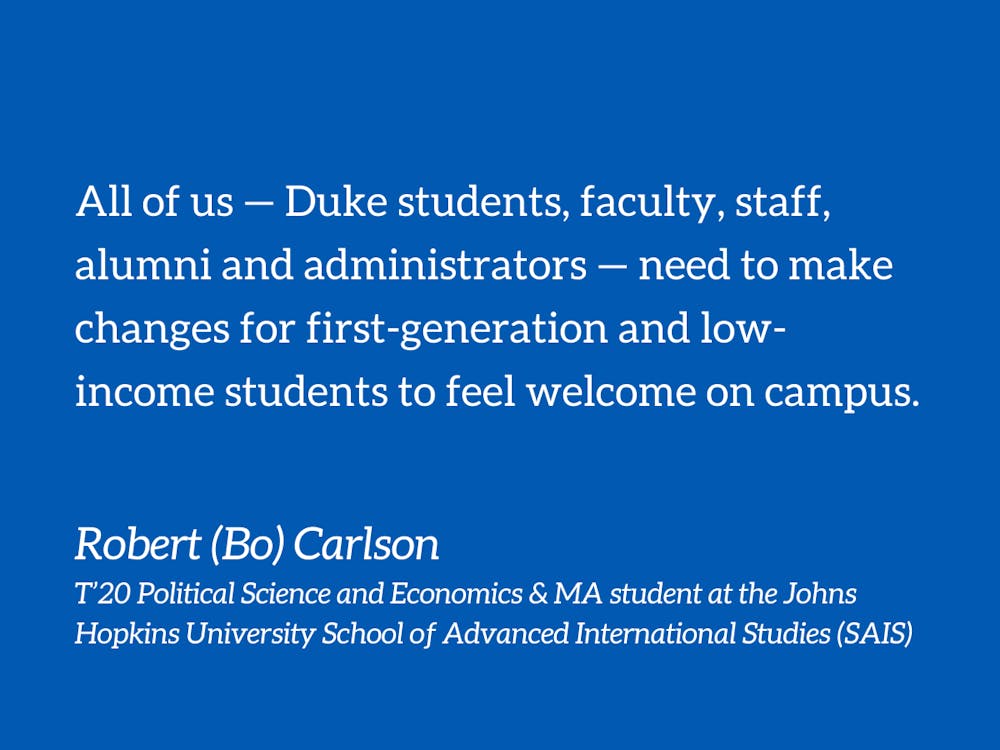When I arrived for my first semester at Duke in the fall of 2016, I was struck by the amount of wealth on display. I’d always considered myself middle class, and indeed I was when compared to the U.S. average. But as a Pell Grant recipient, my family income placed me in the bottom 12 percent of the Duke student body.
Last week’s New York Times article on income equality at Duke was provocatively titled, “Why Does Duke Have So Few Low-Income Students?”, and it succeeded in provoking a response — especially on Duke’s campus. For me, a 2020 Duke alum, it sparked both a personal defense and a deeper reflection.
In short, going to Duke was the best decision I ever made. The financial aid was incredibly generous, to the point where attending Duke was far cheaper than in-state tuition at UNC Chapel Hill. I graduated debt-free, and under a new program launched this fall for North and South Carolina students, my family would have paid $0. Duke sent me to places I could have never dreamed of before college — Spain, Argentina, Guatemala, Morocco. I took classes with top professors in their fields, and through programs like Duke Conversations, I connected with faculty on a personal level.
Other first-generation and/or low-income (FGLI) students — both among my friends and among those quoted in the Times article — have reflected these experiences. Through Duke LIFE and other offices, FGLI students receive free tutoring, free GRE/MCAT study sessions, free textbooks, free laptops, free professional attire for job interviews and a dedicated librarian.
The problem isn’t how Duke as an institution treats its FGLI students; the resources it provides go above and beyond. Rather, the article identifies two problems: (1) Duke isn’t admitting enough FGLI students in the first place, and (2) FGLI students often feel unwelcome on a campus with so much wealth.
To solve the first problem, Duke trustees and leadership must have serious conversations about their admissions policies. If recent debates over race-based affirmative action have brought out any consensus, it's that universities should end affirmative action for legacy students. In July 2023, the New York Times reported on a study by Opportunity Insights finding that legacy students are four times as likely to gain admission to highly selective colleges — even when controlling for test scores! Even if the admissions department drops legacy status from consideration, Duke will continue to admit many qualified children of alumni. But these students should be accepted based on their individual accomplishments, not by luck of their birth.
Duke should take a similarly hard look at elite sports admissions, which wealthy students often use as a back door to admission. Finally, Duke leadership should consider changes to merit-based, full-ride scholarships like the A.B. Duke Scholarship and Robertson Scholars Program. Recipients of these scholarships almost always have compelling qualifications, and the mentorship and cohort-building opportunities are great ways to attract top students to Duke. But adding a 100% grant on top of these opportunities, rather than allocating aid on the basis of need, takes away funding from students who will otherwise struggle to pay for college.
The second problem — that of FGLI students feeling unwelcome on campus — is just as serious but less amenable to top-down solutions. All of us — Duke students, faculty, staff, alumni and administrators — need to make changes.
Rather than self-segregating on the basis of socio-economic status, language, race, gender, political opinions or sexual orientation, we need to connect with people who are different from us. Duke QuadEx is a major step in the right direction, even as it experiences growing pains in the short term. Professor John Rose’s Civil Discourse Project at the Kenan Institute is helping students relearn how to disagree respectfully and form bonds that traverse political boundaries.
Perhaps one of the most important lessons from the Times article is what not to do. The Duke LIFE room in the library is a physical manifestation of a self-segregated space, where FGLI students aren’t forming bonds with the other 88% of their class, nor are the other students benefiting from relationships with their FGLI peers.
To connect organically across these differences, we have to be charitable to each other. Assume good intentions, think before you speak and if someone makes a mistake, correct them respectfully without broadcasting outrage or slinking away from the interaction. These relationships are why you’re at Duke, and they’ll stick with you far longer than any history lecture or economics problem set.
Robert (Bo) Carlson (T’20 Political Science and Economics) is a current MA student at the Johns Hopkins University School of Advanced International Studies (SAIS).
Get The Chronicle straight to your inbox
Signup for our weekly newsletter. Cancel at any time.

